Our Worship
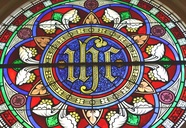
HOLY EUCHARIST
Holy Eucharist is the sacrament commanded by Christ by which we continually remember His life, death, and resurrection; celebrate His presence; and also anticipate His coming again. Unlike Holy Baptism, Holy Eucharist is meant to be repeated again and again as an ongoing experience of Christ’s grace. In the Episcopal Church, Holy Eucharist is open to all baptized Christians. If you wish to know more about the Eucharist, we would welcome a conversation.
Holy Eucharist is the sacrament commanded by Christ by which we continually remember His life, death, and resurrection; celebrate His presence; and also anticipate His coming again. Unlike Holy Baptism, Holy Eucharist is meant to be repeated again and again as an ongoing experience of Christ’s grace. In the Episcopal Church, Holy Eucharist is open to all baptized Christians. If you wish to know more about the Eucharist, we would welcome a conversation.
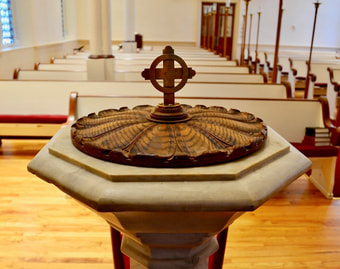
BAPTISM
Holy Baptism is the sacrament by which a person (either an infant or an adult) is reborn in Christ and becomes a member of His Body forever. In the Episcopal Church, Baptism is administered at public worship services. The four principal occasions for this sacrament are the Baptism of Our Lord (January), Easter (late March or April), Pentecost (May or June), and All Saints’ Day (early November). Arrangements for Baptisms should be made well in advance.
Baptism is a non-repeatable sacrament. If you have been baptized with water in the name of the Father, Son and Holy Spirit, you are baptized forever in the eyes of the Church. Some people find it meaningful to reaffirm their baptisms formally, whether because they had previously grown away from faith or in response to a calling from God. We are happy to speak with anyone wishing to make such a reaffirmation.
Holy Baptism is the sacrament by which a person (either an infant or an adult) is reborn in Christ and becomes a member of His Body forever. In the Episcopal Church, Baptism is administered at public worship services. The four principal occasions for this sacrament are the Baptism of Our Lord (January), Easter (late March or April), Pentecost (May or June), and All Saints’ Day (early November). Arrangements for Baptisms should be made well in advance.
Baptism is a non-repeatable sacrament. If you have been baptized with water in the name of the Father, Son and Holy Spirit, you are baptized forever in the eyes of the Church. Some people find it meaningful to reaffirm their baptisms formally, whether because they had previously grown away from faith or in response to a calling from God. We are happy to speak with anyone wishing to make such a reaffirmation.
Other Sacramental Rites of the Episcopal Church
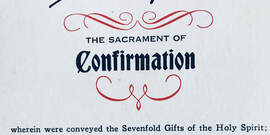
CONFIRMATION
Confirmation is the sacrament in which the person who was baptized as an infant makes a mature affirmation, in the context of public worship, of the vows that her/his parents made on their behalf. It is also the sacrament in which an adult confirms his/her baptismal vows. Confirmation is administered by a bishop, either during a visitation to the parish or at a diocesan-wide occasion. We will gladly help prepare any baptized member who is seeking to confirm their baptism.
Confirmation is the sacrament in which the person who was baptized as an infant makes a mature affirmation, in the context of public worship, of the vows that her/his parents made on their behalf. It is also the sacrament in which an adult confirms his/her baptismal vows. Confirmation is administered by a bishop, either during a visitation to the parish or at a diocesan-wide occasion. We will gladly help prepare any baptized member who is seeking to confirm their baptism.
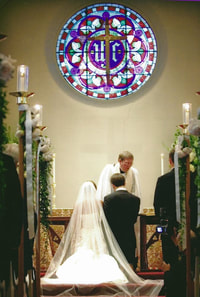
MARRIAGE
Christian marriage is a solemn and public covenant between two people. Through this sacrament, their relationship is imbued with the grace of Christ and consecrated (set apart) as a holy commitment. The canons of the Episcopal Church require that at least one party be a baptized Christian and that couples seek counseling by a member of the clergy before the marriage ceremony.
Divorced persons may remarry in the Church after consultations facilitated by the Parish; couples should allow ample time for such consultations to take place.
Marriages are performed in accordance with the authorized liturgies of the Church and normally include celebration of the Holy Eucharist. They also normally take place in the church, exceptions sometimes being made for specific pastoral concerns.
Christian marriage is a solemn and public covenant between two people. Through this sacrament, their relationship is imbued with the grace of Christ and consecrated (set apart) as a holy commitment. The canons of the Episcopal Church require that at least one party be a baptized Christian and that couples seek counseling by a member of the clergy before the marriage ceremony.
Divorced persons may remarry in the Church after consultations facilitated by the Parish; couples should allow ample time for such consultations to take place.
Marriages are performed in accordance with the authorized liturgies of the Church and normally include celebration of the Holy Eucharist. They also normally take place in the church, exceptions sometimes being made for specific pastoral concerns.

MINISTRATION TO THE SICK AND DYING
One of the most ancient customs of the Church and one of the most tender sacraments we perform is Ministration to the Sick and Dying, sometimes known as Unction (Extreme Unction in the case of those who are near death). During this rite, a priest lays hands on the sick or dying person and, if desired, also anoints her/him with oil. (Holy Communion may be celebrated as well.) In this sacrament God’s grace is bestowed for the healing of the person’s body, mind or spirit, or in preparation for a holy death. Please let us know if you or someone you love would like to receive Ministration/Unction.
MINISTRATION TO THE SICK AND DYING
One of the most ancient customs of the Church and one of the most tender sacraments we perform is Ministration to the Sick and Dying, sometimes known as Unction (Extreme Unction in the case of those who are near death). During this rite, a priest lays hands on the sick or dying person and, if desired, also anoints her/him with oil. (Holy Communion may be celebrated as well.) In this sacrament God’s grace is bestowed for the healing of the person’s body, mind or spirit, or in preparation for a holy death. Please let us know if you or someone you love would like to receive Ministration/Unction.
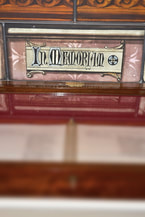
FUNERALS AND MEMORIAL SERVICES
The life of any baptized Christian who has died may be celebrated at St. Andrew’s. The service may be a funeral or a memorial service with both liturgies typically including celebration of the Holy Eucharist. All arrangements are made in consultation with the Parish.
St. Andrew’s Close, the enclosed garden adjacent to the church, provides engraved memorial plaques and burial spaces for cremated remains of members and friends of the parish. The Close is governed by a committee appointed by the Vestry.
The life of any baptized Christian who has died may be celebrated at St. Andrew’s. The service may be a funeral or a memorial service with both liturgies typically including celebration of the Holy Eucharist. All arrangements are made in consultation with the Parish.
St. Andrew’s Close, the enclosed garden adjacent to the church, provides engraved memorial plaques and burial spaces for cremated remains of members and friends of the parish. The Close is governed by a committee appointed by the Vestry.
PARISH PRAYER LIST
Please contact our Parish Office if you would like to add a name to our parish Prayer List: 860-927-3486 or at [email protected]. It is helpful to indicate how long you would like the name to be kept on the list. We remember the faithful departed during the two weeks after their deaths, and on those Sundays when you ask for their names to be included.
Please contact our Parish Office if you would like to add a name to our parish Prayer List: 860-927-3486 or at [email protected]. It is helpful to indicate how long you would like the name to be kept on the list. We remember the faithful departed during the two weeks after their deaths, and on those Sundays when you ask for their names to be included.